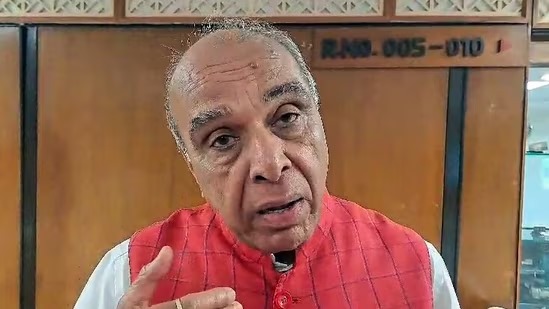
Chairperson of the Joint Parliamentary Committee, Jagdambika Pal recently reconstructed vividly an intense incident in Indian parliamentary history and recalled an incident involving senior politician Kalyan Banerjee. Pal speaks to the high tensions in fights during political debates and the sharp reactions of members in critical proceedings. Reflecting on the episode, Pal told me how he “prayed his way out” of the fiery temper of Banerjee, a veteran leader who had fought many impassioned battles.
The Spark of Conflict
The incident happened at a time when the meeting of the JPC was a high-stakes one, where there would be much-politicised and policy-oriented discussion. The committee was discussing issues that would have far-reaching consequences on governance, and emotions ran high. The atmosphere was charged as members of the House engaged in heated exchanges, asserting their points and challenging the other person.
Just when the debate was heated up, Kalyan Banerjee, with his sharp tongue and no-holds-barred style, came into action. His comments began to be sharp, and at one point, his demeanor became sizzling hot as the argument escalated. Pal, who chaired the meeting, bore the short end of the Banerjee scolding that started as a routine acerbic uttering of differences. What could have easily turned into a routine debate was transformed into an explosive confrontation.
A Storm of Words
Kalyan Banerjee is known for the vigor and intensity with which he makes speeches when in an argumentative political controversy. His way of speaking, while due to this reason, many applaud it, at times could be deemed aggressive. This day, Pal recounts, Banerjee was so incensed that his expressions when Pal saw them came off as mighty intimidatingly strong.
The dispute, which at first appeared workable, worsened with each successive word spewed out by Banerjee. There was no going back for his point. He was straightforward with words, with anger very apparent. Banerjee in typical style did not beat about the bush and lashed out at the stance held by his committee member colleagues.
For Jagdambika Pal, things became very uncomfortable. The chairman of the committee had to see that everything was in order and that the discussion did not go off the rail. But Banerjee’s angry outburst threatened to derail the meeting altogether. He had to play free speech off against controlling the disrupting behavior which could prevent the meeting from going ahead.
“Evidently Escaped by God’s Grace
Reflecting on the incident, Pal wrote about his feelings at the time. He remembered how, by then, disbelief was placed upon that intensity of anger from Banerjee. “It was as if I had escaped by God’s grace,” he said, manifesting to a great degree the level to which he was shocked by the clash. The wording expresses relief but is also tinged with astonishment, as if one harbors a feeling of relief that events did not take a worse turn, wonder at how close things came to exploding.
S Pal’s statement also speaks of the unpredictable nature of political discourse in India. In a country where politics calls forth strong emotions and personal beliefs, such confrontations are not only inevitable but are also part and parcel of the overall experience of living with politics.
Steering through such moments, as Pal himself did, is part of a mark of strong leadership-in not letting such moments spew into chaos, in which the opposition in the House overrides the best of intentions of planning something positive.
Lessons in Parliamentary Conduct
This episode of Jagdambika Pal and Kalyan Banerjee underlines the challenges to decorum in high-pressure political situations. As chair of the JPC, Pal was assigned the task of ensuring that all members had the opportunity to put in their two cents while still keeping the flow within the realms of what is parliamentary behavior.
Banerjee’s anger, though a great testament to his passion for the matters at hand, is a cautionary sign regarding a fine line that separates passionate argumentation from pointless hostility. A reflection of the same encounter by Pal gives an impression that the same politicians are likely to present moments of vehement disagreement with inevitability; but those instances should be well managed so as not to impeach the positive work of governance.
This experience also refers to the personal resilience and grit required to be able to navigate the Indian system of parliamentary processes. Leaders like Jagdambika Pal, who are pretty much always the targets of a political temperament, have to learn to develop a thick skin and a calm demeanor so that business may go on amidst such pressures.
Going Forward
After this encounter, Pal continued to steer the JPC with a steady hand. This has allowed him to rise above the emotional intensity of moments such as this and be perceived as an even-handed leader. The dramatic case of Banerjee is but one of several examples of the tests that have to be run by Pal and similar leaders.
For Kalyan Banerjee, this is more in the nature of adding to his legacy as a fiery orator and politician unfazed by speaking his mind. Even though such an approach at times ruffles quite a few feathers, no doubt whatsoever lies about the passion that drives his politics. Banerjee’s forceful expression of his views is testimony to deep convictions he holds – though these lead on many occasions to explosive confrontations.
In the final analysis, the incident serves to remind of the intensity that much of Indian politics is marked by. As Jagdambika Pal reflects on his “escape by God’s grace,” one can’t help but realize that such instances as are presented above, though challenging, reflect an integral part of the country’s democratic process. Political leaders would go on to fight and quarrel, but it is through such fights and quarrels that ideas are tested, debated, and, ultimately, refined.




